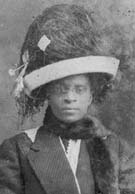Dr. Charlotte Hawkins Brown, age 35, c. 1918
This page is designed to assist those of African ancestry in tracing their roots through Guilford County. Any suggestions and contributions of information are welcome.
- Cyndi’s List ~ African-American
- African American Census Schedules Online, by AfriGeneas
- The African-American Mosaic, by The Library of Congress
- The Church in the Southern Black Community
(Documenting the American South, sponsored by the University of North Carolina at Chapel Hill) - John Hope Franklin Collection
(Duke University Special Collections Library) - African-American Women ~ On-line Archival Exhibit
(Duke University Special Collections Library)
Underground Railroad
- Underground Railroad Foundation
- Underground Railroad Study by the National Park Service
- Underground Railroad
- National Underground Railroad Freedom Center
- wagon for transporting slaves, at Mendenhall Plantation
- Levi & Catharine Coffin of Guilford County, NC, & Richmond, Indiana
- Freedmen’s Bureau Online
- African American Cemeteries Online
- AfriGeneas ~ African-American & African-Ancestored Genealogy
- Christine’s Genealogy Website
Slaves were considered property. Therefore county court minutes before the Civil War contain occasional references to slaves. Also, those doing pre-Civil War research should check deed records, as slaves are reflected in some deeds, in addition to wills and estates.
Slaves Mentioned in Guilford Wills
William Adams will, written 1834 and probated 1835, mentions negro Manuel and his wife Ruth, and negro girl Grace and her child.
John Burney‘s will, written and probated in 1794, mentions “negroe Jeffery”
William Burney‘s will, written 1823 and probated 1824, mentioned the following:
Lizzy – given to his wife and then daughter Rebeccah after wife’s death
unnamed girl slave in daughter Sally Spence’s possession
girl slave named Seal given to daughter Peggy Thomas
Jim and Garison given to son Josias Burney
James Criswell‘s will, written 1822 and probated 1823, mentions Derry (male slave), to be set free at Criswell’s death
William Criswell‘s will, written in 1816 and probated in 1819, mentioned negroes who were given to brother James and sister Mary Criswell; those negroes were not named.
James Dick‘s will, written 1825 and probated 1826, mentions:
negro boy Jo, negro girl Eliza, negro woman Hannah – given to son Hiram Campbell
negro girl Maria, negro woman Rachel – given to daughter Jane M. Dick
negro man Martin – given to son Reuben [Reuben ended up in Madison County, TN]
negro boy George – given to son Thomas
negro boy Jacob – given to son John M.
Thomas Dick‘s will, written 1820 and probated 1821, mentions:
negroes Jim, Harry, and wife Jennie – given to son John W.
negro girl Looey – given to daughter Martha W.
negro Abram, boy Masdey, man Frank – given to son Thomas J. [who died unmarried a few years later]
negro boy Manuel – given to Thomas Lindsay, son of Andrew Lindsay
Robert Lindsay‘s will, written 1818 and probated 1818, mentioned:
negroes Charles, Mary, Chaney, and Fan – given to wife Letty
negro Jake – given to son A. T. Harper Lindsay
negro boy James – given to son Jesse H.
negro Frank – given to son Robert
George Nicks‘ will, written 1838 and probated 1838, mentioned:
negroes Susan, Siller, Milton, William, and Rachel – given to wife Elizabeth
negro girl Clarisa, negro boy Nelson – given to children of son John, who were Elizabeth and John
slave Julia – given to children of deceased daughter Sarah Gibson, who were Elizabeth Richardson, Andrew Gibson, James A. Gibson, Alfred Gibson, Adaline Gibson, and John Gibson
negro girl Jediann, negro boy Madison – given to children of daughter Margaret, who were Quinton N. Davie, Ashburn Davie, John C. Davie, Elizabeth Davie, Lortoro M Davie, and George Davie’s children [George being deceased]
slaves Alfred and Letitha – given to grandson Calvin N. McAdoo
negro boy Rufus – given to daughter Elizabeth McAdoo
John Paisley‘s will, written 1811 and probated 1811, mentioned:
negroes Milly and Aaron – given to son William
negroes Gilbert and James – given to son James
negroes Sophia and Teny – given to daughter Nancy Hannah
negroes Peter, Cate, and Dick – given to son John
negroes Emmy and Isaac – given to son George
negroes Rose and Mary – given to daughter Elizabeth Gibson
negroes Jenny and Moses – given to daughter Mary Ann [surname was still Paisley]
Joel Sanders‘ will, written 1814 and probated 1814, mentioned:
coloured man Tony – was given the “land bought of Jesse Dillon”
[Joel Sanders was a Quaker and owned the Old Mill of Guilford]
Adam Scott‘s will, written 1837 and probated 1838, mentions:
negro girl Riah – given to wife Polly
negro boy Pink – given to son Adam
negro boy Charles and negro girl Harriet – given to daughter Polly Donnell
negro girl Suck and offspring – given to daughter Louisa Neely
Robert Scott‘s will, written 1791 and probated 1791, mentioned negro girl Patience, who was given to wife Mary, provided his wife didn’t marry for two years.




